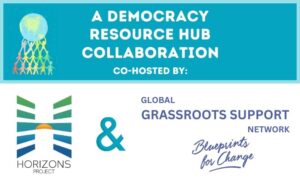
- This event has passed.
Mediation for Movements: Managing Intra-Movement Conflict
April 16, 2024 @ 10:00 am - 11:00 am

Co-Hosted by The Horizons Project and the Global Grassroots Support Network
See clips from the event and resource here. See the whole conversation here.
The Intermestic (international-domestic) Learning Series aims to:
- Strengthen relationships among activists, organizers, peacebuilders, and democracy practitioners across the globe;
- Facilitate opportunities for cross-border learning around strategies and tactics for pushing back against authoritarianism and advancing diverse, just, and inclusive democracy; and
- Build solidarity and explore opportunities for connection within a broader global movement to counter authoritarianism and reimagine democracy.
This series is a Democracy Resource Hub collaboration.*
Background
Pushing back against authoritarianism requires broad-based organizing efforts that can build power by mobilizing large, diverse groups of people. However, bringing people together from different backgrounds, communities, and geographies also means managing diverse needs, concerns, interests, and theories of change. This can lead to frustration, tension, and even conflict when movement members are not aligned on how to prioritize work with limited resources and capacity. For example, while some movement members may want to focus on addressing urgent threats and harm, others may believe that prioritizing work that actualizes our long-term vision for democracy is more important to fully address the threats and prevent the harm from happening. So how can movements manage tension and disagreement about which tactics and approaches to use based on different understandings of the larger problem? What can they do when parts of the movement want to focus on healing and moving forward while others assert that justice and accountability must come first? What to do when some groups refuse to join the same coalitions as others because it can be seen as compromising their principles? Or even how to address internal power struggles?
Movement organizers and scholars from South Africa, India, and the US explored how movements can manage internal conflict when it inevitably arises as they seek to build broad-based pro-democracy coalitions of active, passive, and unlikely allies.
Key Questions
- What are the most common internal tensions that arise within broad-based movements or coalitions?
- How have movements addressed and managed these internal tensions?
- What lessons can be drawn from these experiences?
Speakers
Welcome: Maria J. Stephan, The Horizons Project, US
Panel:
- Zelda Holtzman, formerly of Tshisimani Centre for Activist Education, South Africa
- Ruhie Kumar, Heatwave Action Coalition, India
- Wendy Wood, The Karuna Center, US
- Lisa Schirch, Kroc Institute, University of Notre Dame, US
- Tabatha Pilgrim Thompson, The Horizons Project, US (moderator)
* The Democracy Resource Hub, is a collaborative effort supported by the 22nd Century Initiative, United Vision Idaho, the SHIFT Action Lab, and the Horizons Project. It is hosted by the Commons Social Change Library. For more information and to access a wealth of learning resources to complement these learning exchanges, visit the Democracy Resource Hub.

